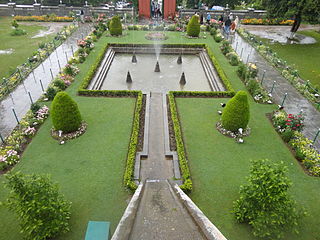Shalimar Gardens may refer to the following Mughal gardens:
Shalimar Gardens may refer to the following Mughal gardens:

The Shalamar Gardens or Shalimar Gardens are a Mughal garden complex located in Lahore, Punjab, Pakistan. The gardens date from the period when the Mughal Empire was at its artistic and aesthetic zenith, and are now one of Pakistan's most popular tourist destinations.

The tradition and style of garden design represented by Persian gardens or Iranian gardens is a style of "landscape" garden which emerged in the Achaemenid Empire. Humayun's Tomb and the Taj Mahal have some of the largest Persian gardens in the world, from the era of the Mughal Empire in India.

Mughal Gardens are a type of garden built by the Mughals. This style was influenced by the Persian gardens particularly the Charbagh structure, which is intended to create a representation of an earthly utopia in which humans co-exist in perfect harmony with all elements of nature.

Shalimar Bagh (Urdu pronunciation:[ʃɑːliːmɑːɾbɑːɣ], Kashmiri pronunciation:[ʃaːlɨməːrbaːɣ]is a Mughal garden in Srinagar of Indian-administered Jammu and Kashmir,o the northeast of Dal Lake. It is also known as Shalimar Gardens, Farah Baksh, and Faiz Baksh. The other famous shoreline garden in the vicinity is Nishat Bagh, 'The Garden of Delight'. The Bagh was built by Mughal Emperor Jahangir in 1619. The Bagh is considered the high point of Mughal horticulture. It is now a public park and also referred to as the "Crown of Srinagar".

The Inner Ring Road refers to one of the two main ring roads, the main inner one and an outer one in Delhi, India. The two ring roads have a combined length of 87 km (54 mi). There are two less significant Ring Roads in Delhi apart from the above two, namely the Rural Ring Road, that runs across the rural areas on the fringe of North West Delhi and West Delhi Ring Road, limited only to the West Delhi region.
Shalimar or Shalamar may refer to:
Baghbanpura is a town and Union Council of Shalimar tehsil, Lahore District, Punjab, Pakistan. It is located along the Grand Trunk Road some 5 kilometres northeast of the main Lahore city.
Tota Rani

Nishat Bagh is a terraced Mughal garden built on the eastern side of the Dal Lake, close to Srinagar in the union territory of Jammu and Kashmir, India. It is the second largest Mughal garden in the Kashmir Valley. Nishat Bagh, is also located on the bank of the Dal Lake. 'Nishat Bagh' is Urdu, and means the "Garden of Joy," "Garden of Gladness" and "Garden of Delight."

Shalimar is an administrative town (tehsil) in Lahore, Punjab, Pakistan. It forms one of the 10 municipalities of Lahore City District.
Rajkiya Pratibha Vikas Vidyalayas, popularly known as RPVV or Pratibha renamed as Dr. Bhim Rao Ambedkar Schools Of Specialized Excellence (DBRA-SOSE) are a school system run by the Directorate of Education, Government of Delhi in Delhi, India. The member schools are in Raj Niwas Marg, Surajmal Vihar, Civil Lines, Yamuna Vihar,Kishanganj, Lajpat Nagar, Shalimar Bagh, Hari Nagar, Rohini, Paschim Vihar, Vasant Kunj, Lodhi Road, Link Road, Dwarka in sector 5, 10 and 19, Gandhi Nagar, Rohini sector 21, Gautampuri, INA Colony,I.P. Extension,Jahangirpuri,Narela and Nand Nagri.
Ashok Vihar is a neighbourhood in the North West Delhi district of Delhi, India. Situated along the Ring Road, Delhi, it is divided into four phases.

Baradari, also Bara Dari, is a building or pavilion with twelve doors designed to allow free flow of air. The structure has three doorways on every side of the square-shaped structure.
Nishat is a town on the eastern outskirts of Srinagar, the summer capital of the union capital of Jammu and Kashmir, India.
Shalimar Bagh Assembly constituency is one of the seventy Delhi assembly constituencies of Delhi in northern India.

Naseem Bagh is a Mughal garden built on the northwestern side of the Dal Lake, close to the city of Srinagar in Jammu and Kashmir, India.

Shalimar Bagh also known as Shalimar Garden is a Mughal garden located on the banks of Yamuna river in Delhi, India. It was named as Aizzabad Bagh when the garden was laid by Izz-un-Nissa wife of Mughal emperor Shah Jahan in 1653 as a tribute and replica of Shalimar Bagh, Kashmir, laid by erstwhile Mughal emperor Jahangir in 1619, the Shalimar Bagh of Delhi is now abandoned but still houses shade trees, majestic parterre and structure such as the Sheesh Mahal and the garden pavilion.